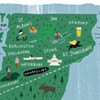Published April 4, 2007 at 11:58 a.m.
BURLINGTON - Mutume Mutwale isn't the only guy driving a Mercedes around Burlington - but he claims he's being singled out for traffic stops. Mutwale and his cousin, Ebale Siriwayo, both immigrants who live in Burlington under "Permanent Resident" status, complain that they've been racially profiled and verbally harassed by local police. Burlington Police Department records tell a different story.
Mutwale and Siriwayo both came to the United States from the Democratic Republic of the Congo. Their mannerisms, however, reflect the colloquial posture of American-born twentysomethings. Mutwale, 21, worked in manufacturing for 18 months in Providence, Rhode Island, before moving to Vermont. Siriwayo, 26, who's employed at an electronics firm, has lived in the Burlington area for eight years.
In an April 1 interview at his home, Mutwale claimed, "The cops are following me every day." He attributed the alleged profiling in part to his car - a 1994 Mercedes with temporary plates - but added that racial bias also played a part in the officers' behavior. Siriwayo noted, "I don't drive a nice car, but I get pulled over. There's racial profiling going on around here. It can be because of the car - but it can also be because of your color."
Two recent incidents point to larger trends of discrimination, the men claim. On March 21, Stanislav Hvorikov of the Chittenden County Sheriff's Dept. stopped Siriwayo and a friend because Siriwayo's 1998 Ford Contour had an air freshener affixed to its rear-view mirror. Siriwayo was driving without insurance, so Hvorikov's subsequent decision to tow his car was legally justified. But according to Siriwayo, Hvorikov spoke to him with undue aggression. "He was ordering me to do things because he had power over me," Siriwayo insisted. "And it pissed me off."
On March 27, a Burlington police officer stopped Mutwale in the parking lot outside Global Markets, an Old North End grocery-café where he often buys calling cards. According to Mutwale, the police officer, whose name he didn't record, didn't tell him why he'd pulled him over, and made inquiries such as "Where did you buy this car?" - as if to imply that the vehicle had been stolen.
Waell Murray, 54, has operated Global Markets since he moved to Burlington in 2003. A 1984 emigrant from Palestine, Murray says that African immigrants and refugees - many of whom speak better French than English, he observes - come into his store to wire money and to buy calling cards, goat meat and semolina flour. Murray alleges that "people are pulled over almost every night" in front of his establishment. He adds that officers from the Burlington Police Department - which he likens to a "gang" - aggressively target members of Burlington's immigrant and refugee communities.
According to a 2003 report by the Vermont Center for Justice Research provided to Seven Days by the Vermont Human Rights Commission, black males are 1.5 times more likely to be arrested in Vermont than are white males. Hal Colston, founder and executive director of the Burlington nonprofit NeighborKeepers, claimed in a Sunday op-ed in The Burlington Free Press that Vermont is the only state besides Mississippi that does not "measure and analyze police stops."
Allen Gilbert, executive director of the Vermont American Civil Liberties Union, says he's "disturbed" by the allegations, but he points out that they're still unsubstantiated. "It is the responsibility of all public officials to make sure that these illegal violations don't occur," Gilbert states.
Hvorikov of the sheriff's department did not return a phone call for this story.
Informed of Mutwale and Siriwayo's allegations, BPD Deputy Chief Michael Schirling expressed concern. In an interview at police headquarters, where he was joined by Police Chief Thomas Tremblay, Schirling emphasized that the department works hard to train its police officers in what he called "cultural competency." As examples of the force's commitment to tolerance, he cited his department's "bias-free" policing policy, the presence of minorities on its hiring and promotion panels, and officers' participation in a "Reading to End Racism" program.
"We carefully investigate all complaints," he noted, adding that his department typically examines "allegations of bias conduct" in "significant detail." Moreover, Schirling and Tremblay suggested that certain classified documents on file in Burlington Police Department archives would shed light on Mutwale's and Siriwayo's accusations.
In response to this reporter's request, Mutwale and Siriwayo came to the Burlington Police Department on April 2 to meet with Schirling and release documents from their respective records of police contact. Examination of the documents revealed that the Burlington Police Department files contain only one report of Mutwale's being stopped - in May 2006, for having rolled through a stop sign. According to the report, he received a warning. Officials also confirmed having a record of the March 28 incident outside Global Markets, but that report is still classified. Siriwayo released only one traffic-related report - a June 2004 warning for running a red light. He chose to keep other police records confidential.
Toward the end of the meeting, Schirling invited the two men to participate in the Burlington Police Department's "ride-along" program - a police-sponsored initiative that allows citizens to accompany police officers on their rounds. Schirling also offered the men places on the board of a tentatively titled "Diversity and Cultural Competency in Policing Work Group."
Following the meeting with the police, Mutwale and Siriwayo maintained that their official record of police contacts doesn't account for times they've been followed by police cars or stopped outside of Burlington. Siriwayo, who estimates that he's been "officially" stopped roughly 15 times in the past five years, said he plans to participate in both the ride-along program and the diversity work group.
"I haven't decided yet," Mutwale said of Schirling's offer. "Sometimes they make you do all that to try to make you forget everything."
Related stories this week:
Out of Africa... and Into Vermont: Refugees and local activists make cross-continental connections
By Kevin J. Kelley
Radio Africa: A new radio show reaches out to new Vermonters
By Cathy Resmer
From the archives:
Workshop Attempts to Help African Refugees Adjust to U.S. Rules and Regs (8/9/06)
By Cathy Resmer
The State's Most Recent Refugees Get a Boost (1/25/06)
By Cathy Resmer
Africans, Unite: Vermont opens its doors to refugees. Now what? (12/14/05)
By Cathy Resmer
More By This Author
Speaking of...
-

Best rock artist or group
Aug 1, 2018 -

Opinion: Should Rape Victims Get Custody Rights?
Feb 26, 2014 -

At the Junction of State and Federal Law, I-91 Checkpoint Becomes Site of Legal Collision
Feb 5, 2014 -

Maple Makeover? Vermonters Discover a New Sugaring Technique
Feb 5, 2014 -

Disharmony on Prospect Street: A Dispute Between Neighbors Strikes a Sour Note
Feb 5, 2014 - More »
Comments
Comments are closed.
From 2014-2020, Seven Days allowed readers to comment on all stories posted on our website. While we've appreciated the suggestions and insights, right now Seven Days is prioritizing our core mission — producing high-quality, responsible local journalism — over moderating online debates between readers.
To criticize, correct or praise our reporting, please send us a letter to the editor or send us a tip. We’ll check it out and report the results.
Online comments may return when we have better tech tools for managing them. Thanks for reading.












































